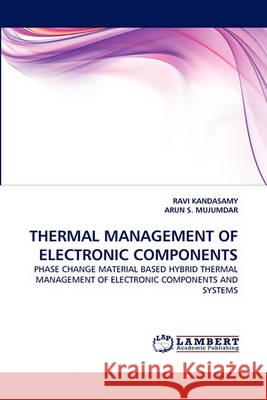Thermal Management of Electronic Components » książka
Thermal Management of Electronic Components
ISBN-13: 9783838360874 / Angielski / Miękka / 2010 / 152 str.
Thermal design in electronics cooling is to achieve effective heat removal to increase reliability and life of the components and systems. This book focuses on cooling of a Flip Chip (FC) package without the use of phase change materials(PCM). A numerical thermal model was developed and validated. CFD Simulation is performed for PCM and non-PCM based material studies. Relevant thermal performance data were obtained to show the effects of thermal interface material, lid, heat sink and process variables. Excellent agreement found between the numerical and the measured data. A novel PCM-based passive thermal control of electronic devices was investigated experimentally. A tall enclosure with uniform/discrete heat sources applied on sides for PCM melting and another with a PCM-filled heat sink setup developed and tested. PCM-based cooling technique is attractive thermal concept for transient applications. Effects of various parameters on melting/freezing times were studied. Flow visualization experiments were also made to determine the PCM melting rates. Finally, a 2D numerical study was conducted to compare simulation results with experimental data.
Thermal design in electronics cooling is to achieve effective heat removal to increase reliability and life of the components and systems. This book focuses on cooling of a Flip Chip (FC) package without the use of phase change materials(PCM). A numerical thermal model was developed and validated. CFD Simulation is performed for PCM and non-PCM based material studies. Relevant thermal performance data were obtained to show the effects of thermal interface material, lid, heat sink and process variables. Excellent agreement found between the numerical and the measured data. A novel PCM-based passive thermal control of electronic devices was investigated experimentally. A tall enclosure with uniform/discrete heat sources applied on sides for PCM melting and another with a PCM-filled heat sink setup developed and tested. PCM-based cooling technique is attractive thermal concept for transient applications. Effects of various parameters on melting/freezing times were studied. Flow visualization experiments were also made to determine the PCM melting rates. Finally, a 2D numerical study was conducted to compare simulation results with experimental data.











